Poverty

A favorite movie of mine growing up was the 1999 cartoon Our Friend, Martin. It combines two of the subjects I love most: time travel and Martin Luther King Jr. The main character, Miles, a Black sixth grader, visits the childhood home of King and ends up traveling back in time to meet King at various stages of his life. Miles, who was largely unaware of King before time traveling, eventually learns that King was assassinated. In order to prevent this, Miles convinces his new friend Martin to come to the future with him. And while that decision spares King’s life, the movie makes it clear that Miles saving his friend’s life would prevent the racial equality we now enjoy in the U.S.
In the modern U.S., are we really enjoying a post-King racial equality?

This week the House voted with a resounding margin of 357 to 70 to pass a bill that includes support for low-income families with multiple children. If passed in the Senate, the “Tax Relief for American Families and Workers Act” will enhance the Child Tax Credit by expanding eligibility and adjusting payments for inflation, provisions that would benefit about 16 million children in families with low income, lifting 400,000 children above the poverty line.

When I was living on the West Side of Chicago, friends and family would often say that they couldn’t comprehend why I would want to live in such a “dangerous” area. The exchange would usually go something like the following: “I can’t imagine why you’d want to live in Chicago, considering all the gun violence.” “Are you worried about me being shot by the police?” “Well, no. The criminals are the ones who are shooting people.” “The police shoot people too. And there’s a reason the ‘criminals’ are resorting to violence.”
I would then go on to explain the antecedents to Chicago’s gun violence: racial segregation and systemic disinvestment. Beginning in the 1950s and into the ’70s, white Chicagoans fled the South and West Sides because they couldn’t imagine being neighbors with Black people. Because of this, these areas became predominantly Black, and the city has refused to invest resources into these neighborhoods to reverse their poor conditions. The South and West Sides are still suffering from disinvestment today, and this disinvestment is a major contributor to gun violence.
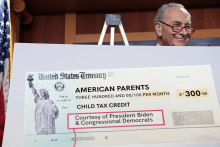
During the pandemic, something peculiar happened: The child poverty rate in the U.S. fell, reaching an historic low of 5.2 percent in 2021. The decline was largely a result of the federal spending in social safety nets like Medicaid, SNAP, and the Child Tax Credit, as well as direct payments to families. Anti-poverty advocates celebrated the win.

I was supposed to be taking a writing day this past Monday, but the sound of sirens kept distracting me. Sirens in my Seattle neighborhood are not unusual, but the sirens blared from early morning until noon. By that time, I’d heard 10 or more police cars drive by, which felt different. So, during my lunch break, I resolved to walk down the street to see what all the hullabaloo was about. I figured I wasn’t getting any writing done, so I might as well go investigate.
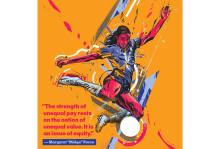
CHRISTIAN DISCIPLESHIP is inherently about choosing sides. Yes, some might harbor a temptation to take the supposedly safer path of remaining “neutral,” but that's a delusion: Such alleged neutrality always favors the status quo. To paraphrase Edmund Burke, if good people don't choose sides, the “side” with power and wealth will always win. Or as Lutheran pastor Korla Masters puts it in this issue, “Jesus invites ... us to whole lives of asking ourselves which side we are on and whole lives of answering that our entire selves belong to the kingdom of heaven.”
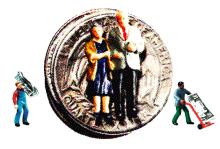
MATTHEW DESMOND, a Princeton sociologist and author, has grown tired of calls to reduce poverty — because he knows we can abolish it. In his new book, Poverty, by America, Desmond explores not the lives and struggles of people who are poor — but poverty, and the conditions that cause it. And Desmond contends that the lives the rest of us live are often connected to the conditions that cause poverty.
“To understand the causes of poverty, we must look beyond the poor. Those of us living lives of privilege and plenty must examine ourselves,” Desmond writes. “Are we — we the secure, the insured, the housed, the college educated, the protected, the lucky — connected to all this needless suffering?”
Desmond is the son of a pastor, and his work is rich with spiritual metaphor and flare while grounded in the material realities of poverty and the conditions that cause it. He dedicates a chapter of his book to refuting the idea that “neoliberal” cuts in welfare spending are to blame for poverty. “There is no evidence that the United States has become stingier over time. The opposite is true,” he writes. Instead, the problem is “a fair amount of government aid earmarked for the poor never reaches them.” Sojo.net associate news editor Mitchell Atencio spoke with Desmond about his new book, community building, and capitalism. —The Editors
Sojourners: Theologian Gustavo Gutiérrez defines poverty as “premature and unjust death,” saying that “the poor person is someone who is treated as a non-person, someone who is considered insignificant from an economic, political, and cultural point of view.” Is that a good way to describe poverty?
Matthew Desmond: I think that’s a factual way to describe what poverty is. Between 2001 and 2014, the richest women in America gained three years of life and the poorest women gained 15 days. So, poverty is death. There was a study that came out very recently that showed that one of the leading causes of death in the United States is poverty. I think that when we deny people access to basic needs, and we deny them basic economic security in this rich land, we do deny them life and happiness itself.
The other part of the quote about insignificance is very interesting because it does seem that in our popular culture — our TV shows, our movies, our children’s books — there are often no portrayals of real poverty in those media, and so it’s kind of amazing how seamlessly the poor can be erased from everything we’re reading and watching and reading to our kids.
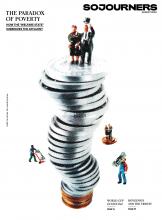
How the “welfare state” is designed to subsidize affluence rather than fight poverty.
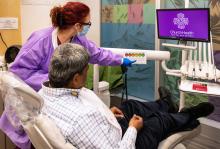
IN SEPTEMBER 1987, ordained Methodist minister and practicing physician G. Scott Morris opened Church Health, a faith-based health care center in Memphis, Tenn. The first clinic tended to 12 people. Over 35 years later, more than 80,000 different individuals have come through Church Health’s doors. When they started, Memphis was the poorest city in the country, but Morris and companions didn’t open Church Health center as an act of charity. Church Health’s mission has always been about demanding justice. His book Care: How People of Faith Can Respond to Our Broken Health System tells the story of clinics across the U.S. where people practice Jesus’ command to heal. — The Editors
I FIRST CAME to Memphis in 1986. Having completed my theological and medical education, I was determined to begin a health care ministry for uninsured people working in low-wage jobs. I had dreamed of this for years as I slogged my way through the training that would make it possible. When the time came, I chose Memphis because historically it is one of the poorest major cities in the U.S. Today we see patients in clinics for primary care, urgent care, dental work, and optometry services. Behavioral health, life coaching, and physical rehabilitation are integrated into our clinics, and we have a teaching kitchen offering classes on culinary medicine for patients and the community. The Church Health model is used in more than 90 clinics around the country. There are about 1,500 free and charitable clinics in the U.S., many of which have faith-based connections.
God calls the church to healing work. Jesus’ life was about healing the whole person, and Jesus is the church in the world. Tradition suggests that Helena, the mother of the emperor Constantine, was the first to open a hospital specifically to care for the poor. The ancient world never had a system to care for the sick who were poor until Christians offered hospitals. Even Julian the Apostate, a fourth-century Roman emperor who did not have much use for Christians, wrote, “Now we can see what it is that makes these Christians such powerful enemies of our gods, it is the brotherly love which they manifest toward strangers and toward the sick and poor, the thoughtful manner in which they care for the dead, and the purity of their own lives.” We are still Jesus’ disciples, the body of Christ running after God’s priorities in the world together. What does it look like to have a healing ministry in today’s world?
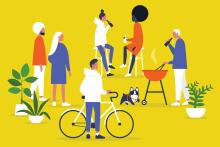
FOR SOME REASON, conversations about economics and the church are rare these days — even though scripture includes more than 2,000 verses on poverty, such as laws in the Hebrew Bible on debt, labor, and land ownership. In the gospels, Jesus had many conversations with people about their relationship to money.
Our daily lives wade in the waters of economics, even in the most ordinary ways. When I brushed my teeth this morning, for instance, I used a brand-name electric toothbrush and a brand-name toothpaste, one that claims to be gentle on tooth enamel. After leaving my apartment, I gazed ahead to the street corner, where a man with a familiar face extended his hand in need to passersby. On the streets of New York City, the human cost of economic insecurity is painfully evident. I made my way eastbound toward Park Avenue; the potholes had me pondering how my hood is often overlooked in the city’s infrastructure budget. Yet, somehow, new “affordable” luxury apartments pop up, seemingly out of nowhere; I sometimes wonder if these buildings just appear overnight, ready-made. I’m also reminded that our local community board, through its land use committee, had some say in these new developments.

THERE IS A DISTURBING sense of déjà vu in the Philippines. Thirty-seven years after the nonviolent People Power movement ended the brutal and kleptocratic 20-year reign of Ferdinand Marcos Sr., his only son and namesake sits comfortably in the presidential palace. Following in his father’s footsteps, President Ferdinand “Bongbong” Marcos Jr. is once again cozying up to the United States.
In 2012, the Obama administration began to “rebalance” U.S. military and trade agreements in Asia. Since 2014, the U.S. has had access to five military bases in the Philippines and trains Filipino soldiers under the Enhanced Defense Cooperation Agreement (EDCA) — all part of Obama’s “pivot to the Pacific.”
In February this year, Marcos agreed to allow the U.S. military to pre-position troops and weapons at another four bases. This gives the U.S. the largest military footprint it has had in the Philippines in 30 years, when a Filipino-led anti-colonial independence movement led to the removal of all permanent military bases in their country.
In its push to expand EDCA, the Biden administration said it would spend $82 million on projects at the first five bases. In addition, U.S. ambassador MaryKay Carlson announced $100 million in new foreign military financing for the Philippines “to use as it wishes.” The Philippines is already the largest recipient of U.S. military assistance in the region, receiving $1.14 billion in weapons and equipment since 2015. U.S. and Philippines government officials claim that the purpose of this growing U.S. military presence is to help with humanitarian crises and disaster relief, as well as to prepare for a future conflict with China, most likely over Taiwan.

WHAT IS A devout village to believe in during a time of famine and plague? Ottessa Moshfegh presents a story devoid of hope and redemption in her latest novel Lapvona, proving that in dire times, believing is not a want but a need.
Moshfegh has a flare for brutality (Eileen and Death in Her Hands). With Lapvona, Moshfegh has crafted a medieval fantasy in the vein of Game of Thrones. It reads like a fairy-tale epic for adults, with its cast of fringe characters and fable-esque sequence of events. But this fantasy is far more depraved: As religious as the villagers are, there is no redemption to be found in this village.
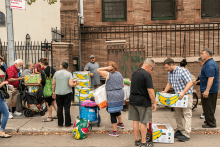
Far too many Christians cling to a stubborn belief that individual acts of charity are sufficient to fulfill their obligation to help all those experiencing hunger and poverty. While acts of charity like donating to a regional food bank or volunteering at a local soup kitchen are commendable and indeed necessary, they are not sufficient. Christians not only have a duty to do good works through individual charity, but also to urge their political representatives to do what is in their power to end hunger in the U.S. and around the world.

EMILY (AUBREY PLAZA) is caught in a vicious catch-22. She’s in deep student debt, but a criminal infraction keeps her from getting a job to pay down her balance. Emily’s stuck working catering gigs, and what little money she can set aside goes to her loan interest, practically ensuring she’ll never be able to get her head above water.
When a co-worker offers her a chance to make some extra cash, Emily jumps at the opportunity. It may be highly illegal, but what other choice does she have?
Writer/director John Patton Ford’s Emily the Criminal is a millennial version of classic gangster noir, with Plaza’s Emily drawn deeper into a criminal underworld where fast payout overrules ethics. Ford’s film never glamorizes Emily’s experiences, instead showing us a desperate person fed up with a world that gives her virtually no other choice but to break the law to survive.

How do marketing techniques, such as surveillance and data gathering, fit with the mission of the church?
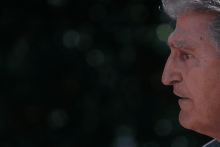
Three weeks ago, it seemed impossible that this Congress and this president would be able to get anything significant and lasting done to confront climate change. But this week, President Joe Biden signed major climate legislation — the Inflation Reduction Act — into law. It’s a bittersweet moment.
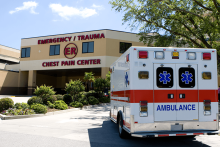
First Presbyterian, a congregation in the Presbyterian Church (USA) denomination, is one of many across the country raising money through the nonprofit RIP Medical Debt to buy and forgive medical debts owed by people who can’t afford to pay them back. The church hopes to raise $50,000 as one of two mission components to its capital campaign — enough to forgive $5 million in medical debt.
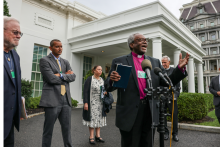
We've long argued that budgets — including our federal budgets — are moral documents. As Christians, we see this as a principle deeply rooted in scripture, including Luke's gospel, which explains that the two greatest commandments are to love God and love our neighbors (Luke 10:27). In that same passage, Jesus tells the parable of the Good Samaritan, a story about how our love for God and neighbor will be tested when our neighbors need us the most.

